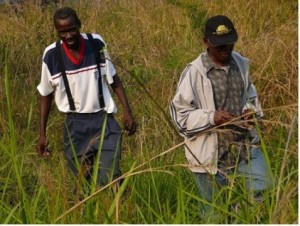By Rachel Pollock
4 February 2010 [MediaGlobal]: The Egyptian government announced Monday that it would be sending a committee to assess farmland in Uganda to grow wheat to then import back into Egypt. Egypt is the leader in wheat consumption and has historically relied mostly on imports. According to the Central Agency for Public Mobilization and Statistics, Egypt consumes 14 million tons of wheat a year but is only able to produce 8 million tons. Egypt has also been interested in formalizing agreements with the Ugandan government, since September of last year. While this has brought up ethical questions of exploitation, another concern is how this arrangement will impact earth changes and food security in the future.
According to a study conducted by the Uganda Journal of Agricultural Sciences in 2006, wheat production has remained stagnant since its introduction to the districts of Kabale and Kisoro during the rainy seasons of 1999. In another report on organic agriculture development in Uganda by the Ministry of Agriculture and the United Nations Development Programme, Uganda was reported to hold 35 percent of the total share of the organic market in Africa. While 85 percent of Uganda’s population is engaged in agriculture, 80 percent of the earnings are due to exports. The report states that maximizing wheat productivity has been a problem because of little investment in organic agriculture, limited research, and a lack of small holders being able to meet the demands of a high volume market.
Last year, Egypt sent a team of specialists to conduct studies on the farmland in Uganda, as well as collect data on exporting grain. Laboro, in the Gulu district, was found to be the most suitable environment to grow wheat, and the Egyptian specialists have since identified several other locations. Egypt has also acquired land in May of 2008 in Sudan for the same purposes, cultivating 2 million acres near the border town of Wadi Halfa, according to Amin Abaza, Agricultural Minister of Egypt. Egypt currently operates three farms in African countries: a rice farm in Niger, a vegetable farm in Tanzania, and a corn farm in Zambia. Egypt intends on providing training for small-scale farmers, equipment, and employment for the rural communities.
One can understand the advantages of forming partnerships with developing countries from a financial and logistical standpoint. However, there has been a great deal of speculation as to whether these African countries are being exploited for their resources. While this is a big concern among human rights groups, it also concerns environmental organizations. Organizations like GRAIN, a non-profit organization that promotes biodiversity, has written numerous topics on the matter. Devlin Kuyek of GRAIN told Mediaglobal, “These [land rental agreements] will increasingly concentrate control over the food system in the hands of corporations and investors seeking to extract huge rents from it, and it becomes increasingly important to ensure that all people have access to food and that rural people have the access to resources they need to sustain their livelihoods.” Kuyek also explained to MediaGlobal that this “land grab,” that we are seeing in developing countries, “will affect their local populations’ access to land and water, as well as their long-term food security, and will bring in an environmentally destructive model of agriculture.”
According to a report of the International Food Policy Research Institute, wheat production will fall by 22 percent in the next 40 years due to overpopulation and climate change. According to Kuyek, “We already have over 1 billion people in a situation of hunger, and climate change threatens to make things much worse.” While desert countries are looking to invest in Africa’s resources in order to combat the recent financial crisis, very little is being done to ensure that food security and wheat production does not become an issue for developing countries in the future. Furthermore, climate change and overpopulation projections suggest that African countries will be particularly susceptible to the negative impacts of land agreements.













